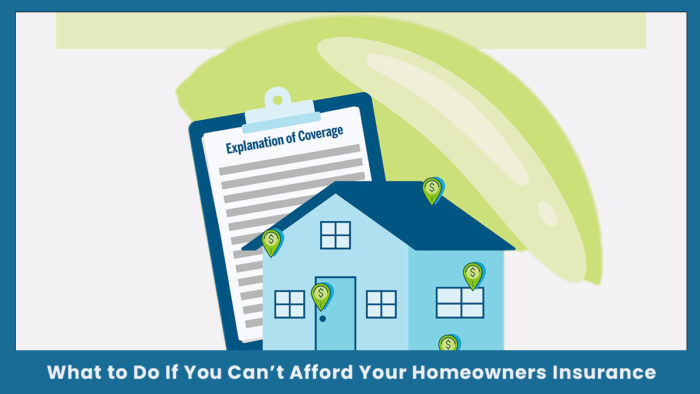What to Do If You Can’t Afford Your Homeowners Insurance – With rising inflation and more frequent natural disasters, homeowners’ insurance costs are going up across the country.

For many people, this increase is putting real pressure on their budgets. If you’re finding it hard to keep up with your homeowners’ insurance payments, here are six steps you can take to get back on track.
1. Take Action Early
If you think you might not be able to make your next insurance payment, don’t wait. Contact your insurance company or agent as soon as possible. It’s best to do this before your policy is at risk of cancellation. Some insurers offer a short grace period if you miss a payment, but once that time passes, your coverage can be canceled.
2. Avoid a Lapse in Coverage
If your policy ends because of non-payment, it could be harder and more expensive to get coverage again. Also, if your home is damaged while your insurance is inactive, you will have to cover the costs on your own.
3. Ask About Solutions
Reaching out early gives your insurer time to help. They may be able to find ways to lower your bill, such as applying extra discounts or adjusting your payment schedule to make it more manageable.
4. Consider Raising Your Deductible
Your deductible is the amount you agree to pay out of pocket when you file a claim. For example, if your deductible is $1,000 and your home suffers $9,000 in damage from a fire, your insurance company would cover the remaining $8,000. Choosing a higher deductible can reduce your yearly premium.
5. Compare Different Insurance Providers
Not all insurers calculate their prices the same way. If your current policy becomes too expensive, it may be time to explore other options. You can compare quotes online, call insurance companies directly, or work with an agent. Some companies, like State Farm use their dedicated agents. Others sell through independent agents who can help you compare prices from several insurers.
To find a fair deal, it’s best to review at least three different quotes. Getting multiple quotes may be harder. If that’s the case, an experienced independent agent can guide you through the process.
If you’re still having trouble getting covered, ask your agent about state-backed options. Many states offer FAIR plans, which provide coverage for homeowners who can’t find a policy elsewhere.
6. Ask About Discounts
Many insurance companies offer a range of discounts that could lower your premium. You might qualify for savings if you bundle your home and auto insurance, install safety devices like smart smoke detectors, or even work in certain fields. Talk to your agent or insurer to be sure you’re not missing out on any available discounts. Upgrading your home can also lead to savings, especially if the improvements help reduce future risks.
Before spending money on upgrades, consider the cost of improvements versus the potential insurance savings, especially if your budget is already tight.
7. Improve Your Credit Score
It might be tough to focus on credit if you’re already facing financial stress, but boosting your credit score could lead to more affordable homeowners’ insurance in most states. That’s because many insurers use a credit-based insurance score when setting your rate.
Studies have found that homeowners with lower scores are more likely to file claims. As a result, they often pay significantly more. Working to improve your credit could make a real difference in what you pay.
8. Review and Adjust Your Coverage
If you’ve explored other options and your insurance still feels too expensive, take a closer look at your policy. You might be able to lower your premium by adjusting some of the optional coverages.
For example, consider removing protection for things you no longer own, such as high-value jewelry. You could also explore switching from replacement cost to actual cash value for your roof, though this means you would get less money if you ever file a claim.
Reducing coverage comes with risks and should only be done carefully. If you cut too much, you could face large out-of-pocket costs after a loss. Still, limited coverage is better than none at all.
What You Shouldn’t If You Can’t Afford Your Homeowners Insurance
While cutting back may be an option, canceling your policy completely is not a good idea. If you have a mortgage, your lender requires you to keep homeowners insurance. If they find out your coverage has lapsed, they will usually take out a policy for you and add the cost to your loan. These lender-placed policies are often more expensive and offer fewer benefits than a standard policy.
If you own your home outright, you can technically go without coverage. But doing so could be financially devastating. A fire, storm, or other disaster could leave you with nothing. Unless you have enough savings to rebuild and replace everything you lose, keeping at least some insurance in place is a safer choice.



